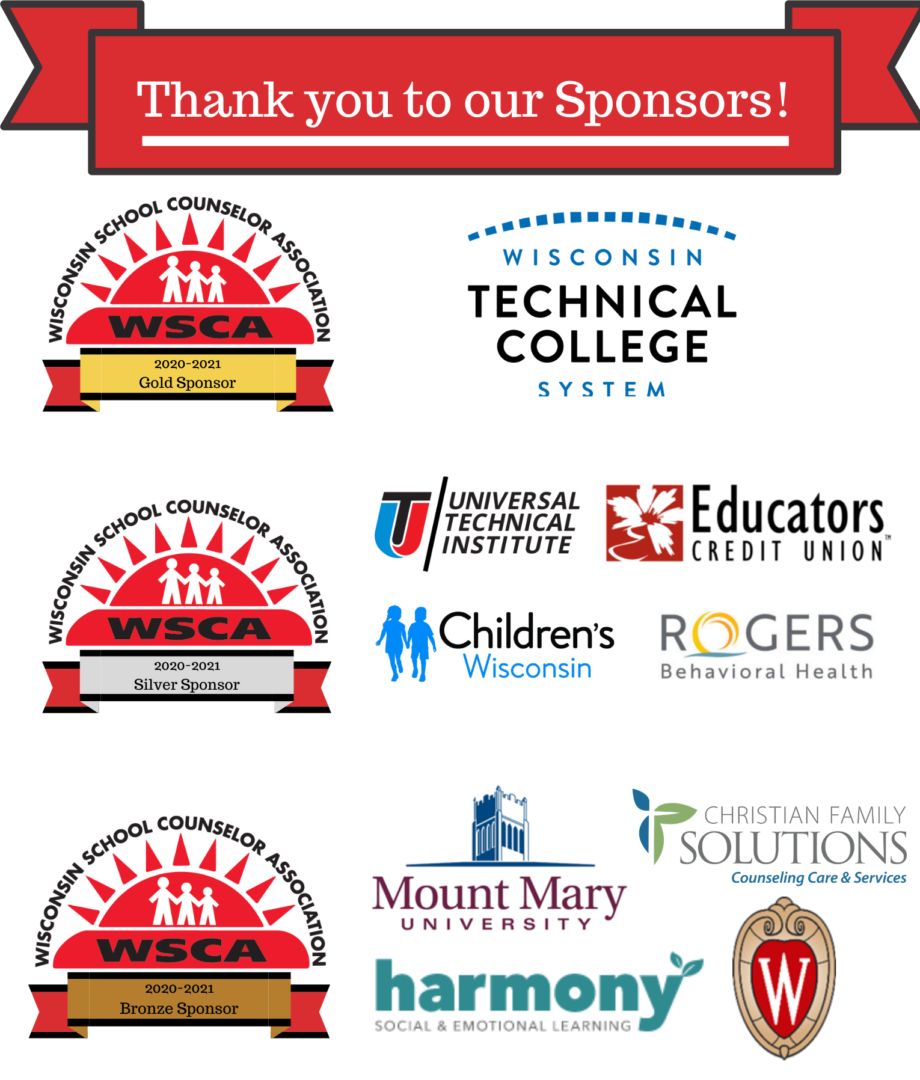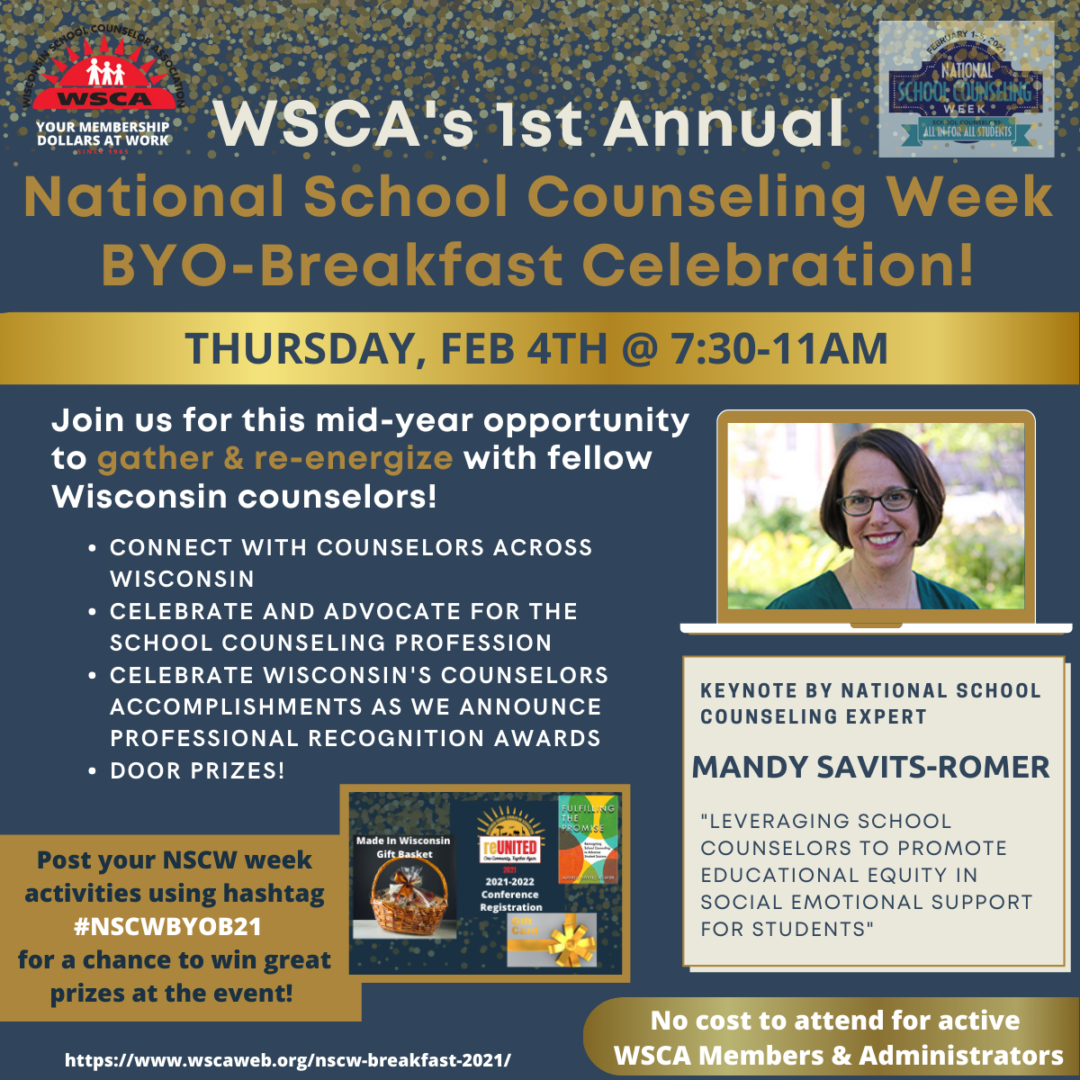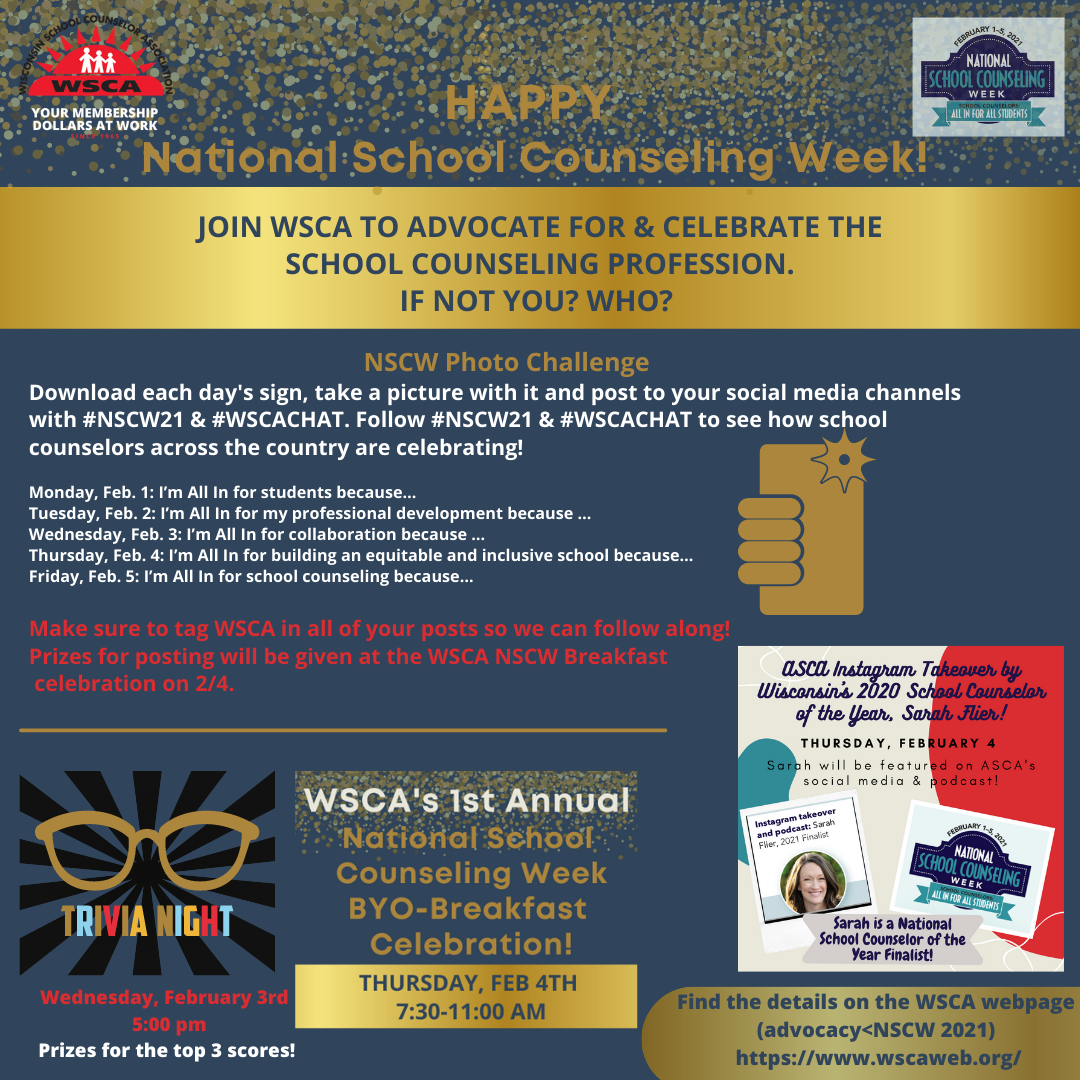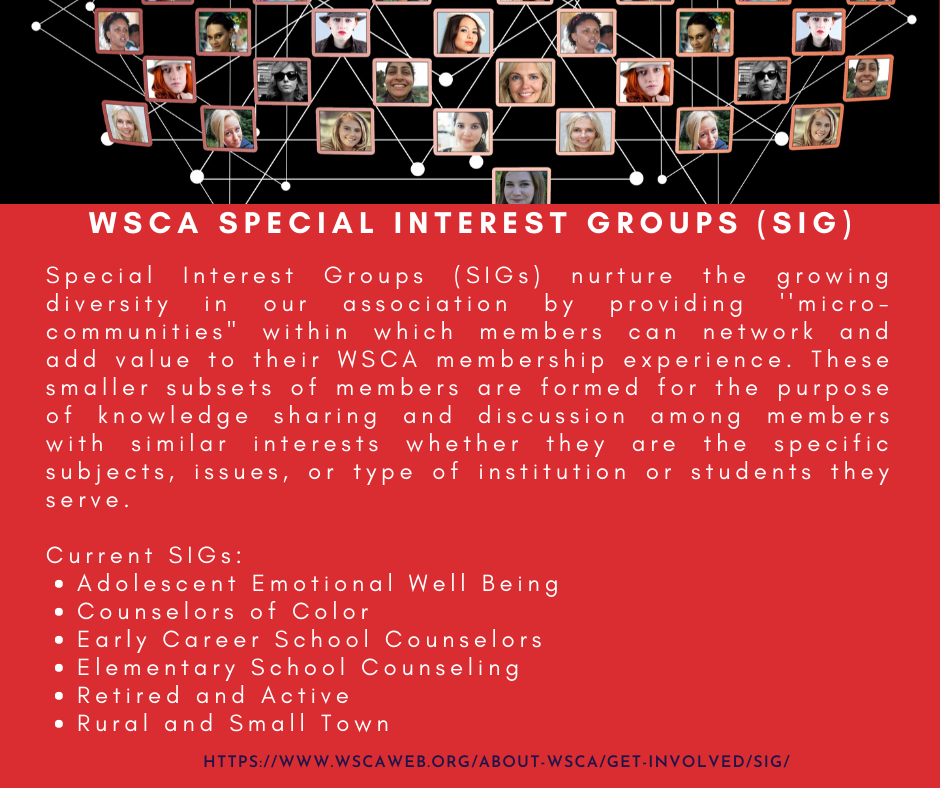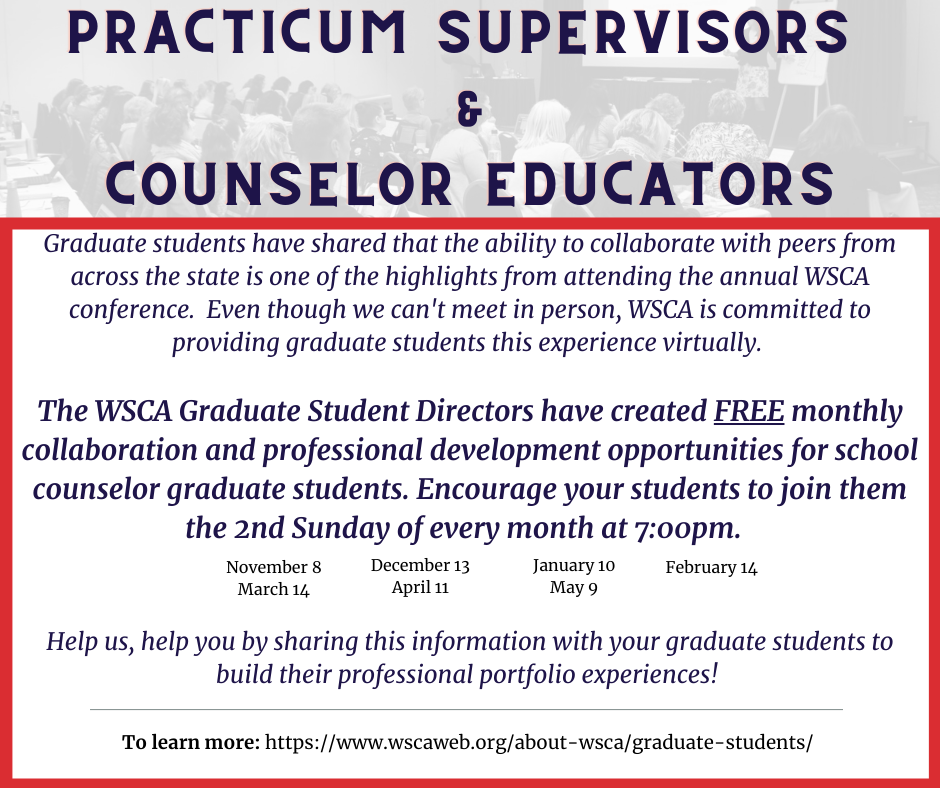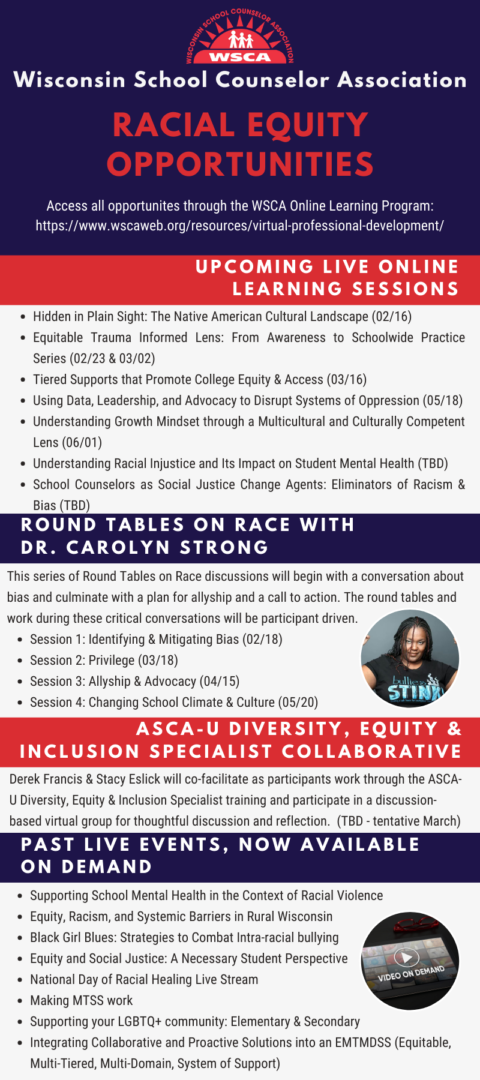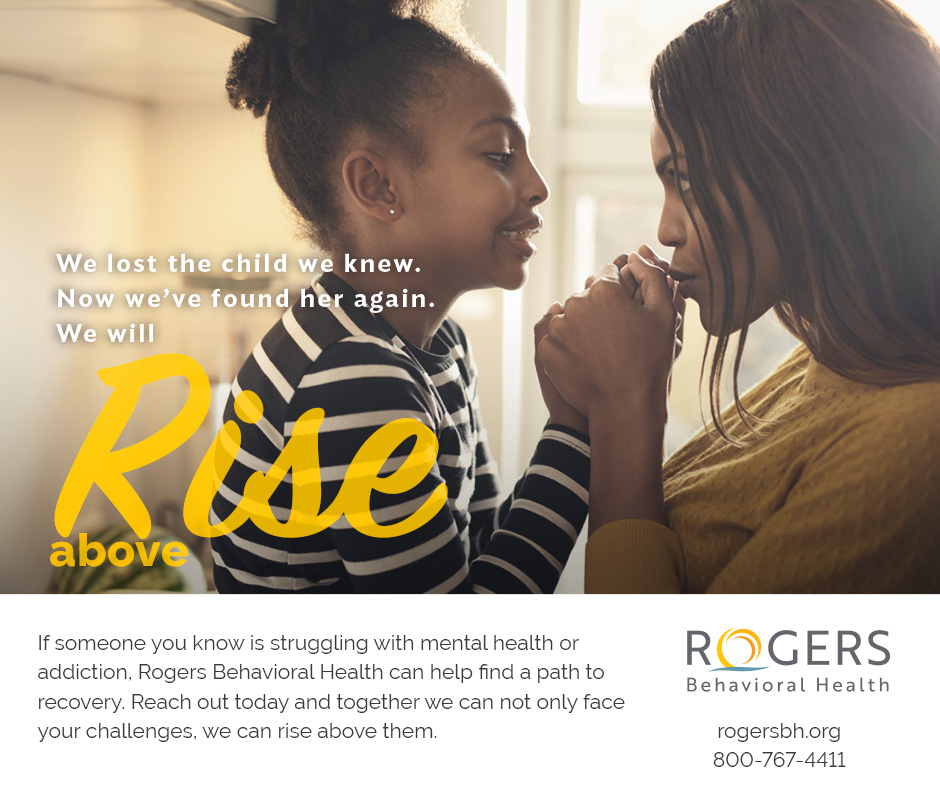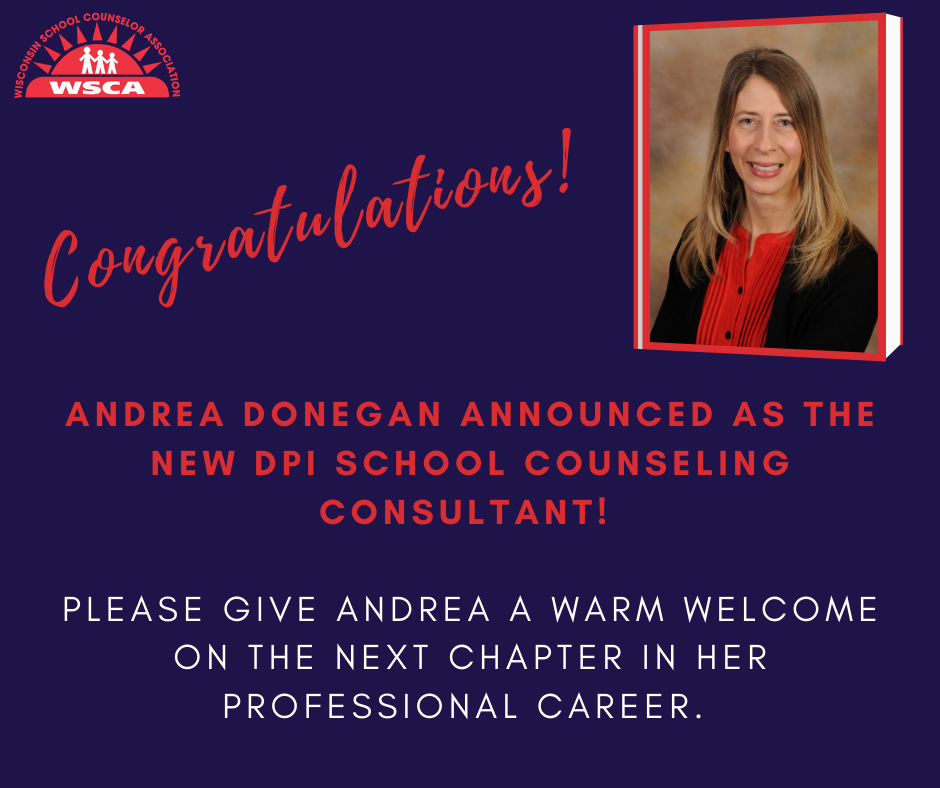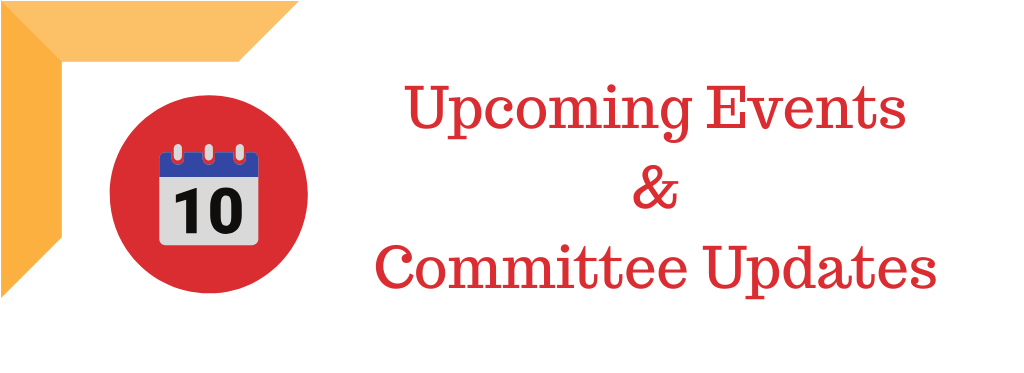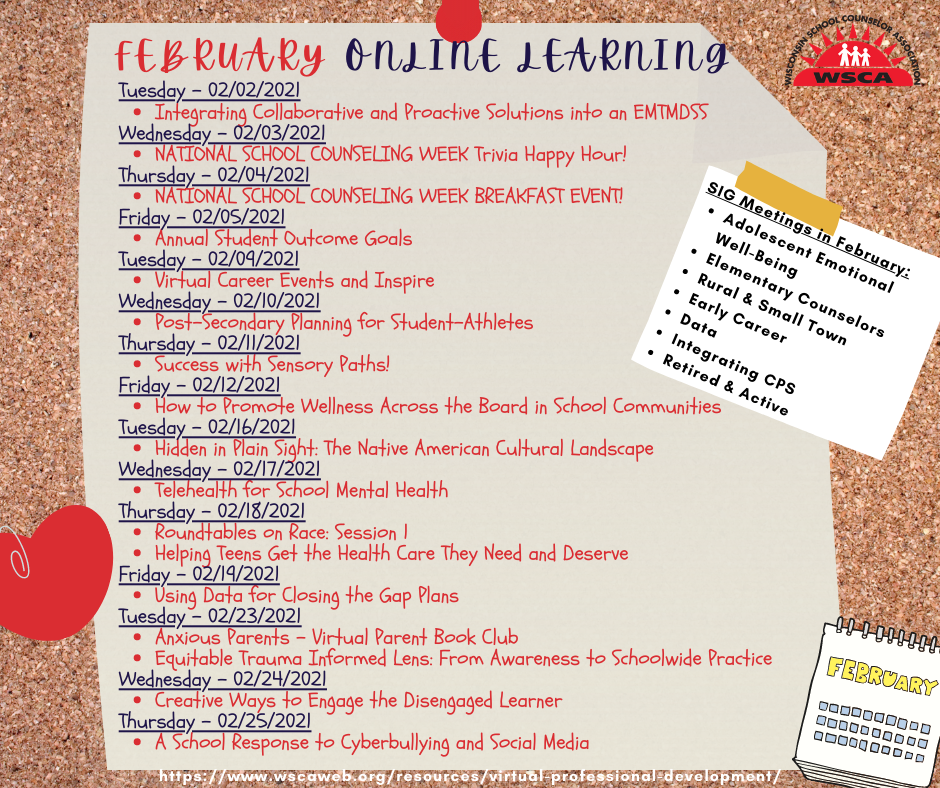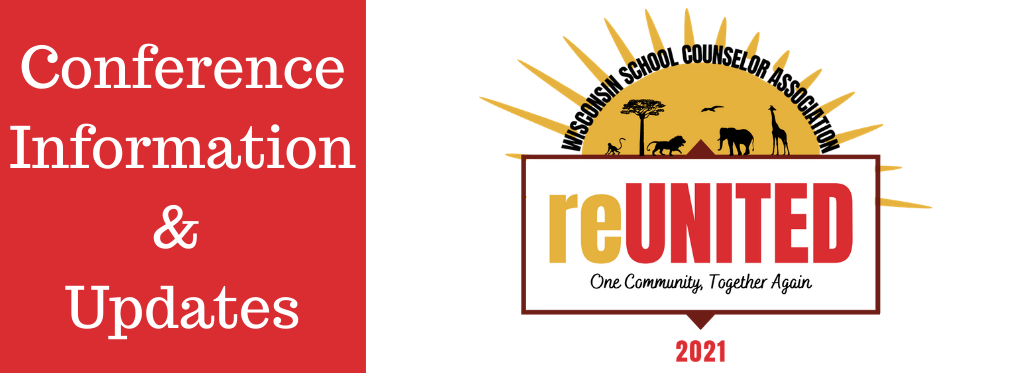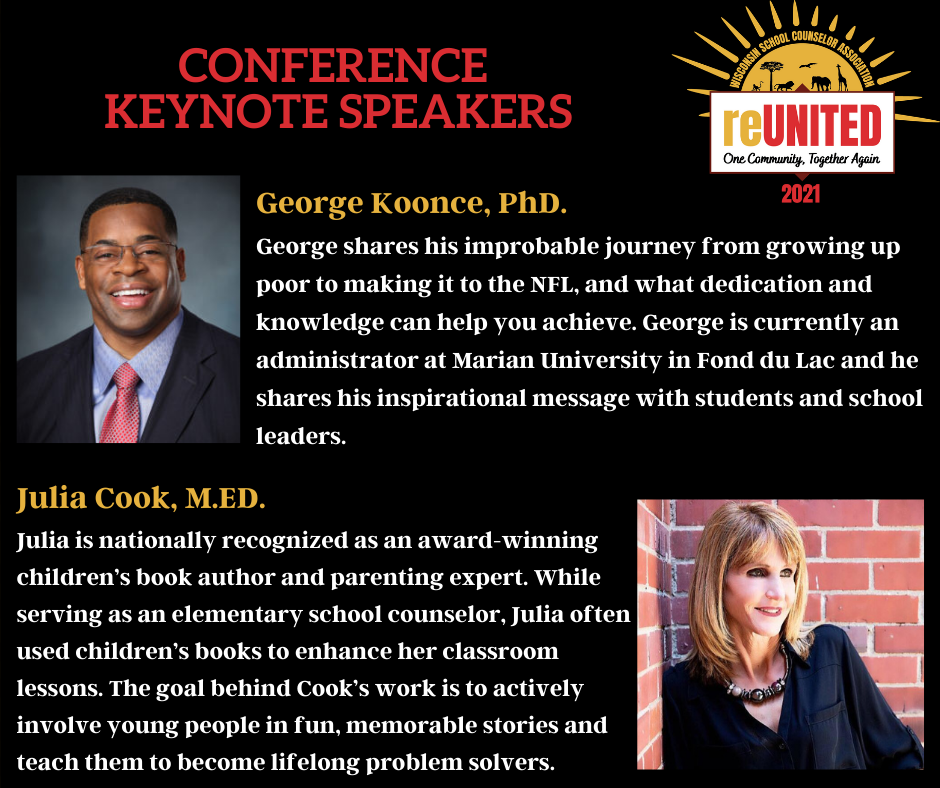
A message from the WSCA Executive Director

Dear WSCA members,
Happy National School Counseling Week! It is so exciting to hear all the amazing programs, services and supports that counselors are providing to students across the state as you advocate for the school counseling profession. WSCA is looking forward to also CELEBRATING you this week. We see you, we hear you, and we appreciate all you do in your school communities.
The theme for this month’s newsletter is self-care. This is a monthly theme we have every year for WSCAlink and it seems like every year I publicly vow that I will try to do better (almost like the New Years’ resolutions that I finally stopped doing). Sarah Flier, 2020 WSCA School Counselor of the Year, and WSCA Director of Data said something to me recently that keeps running through my head, “you also stress that we take care of ourselves – hope you are taking care of you too!”. I am going to own that I am horrible at this. There is always something that needs support and attention. When you work from home and your teenage kids say they never see you, it is sending a clear message that something needs to change.
In reflecting on where I need to start, the first step for me is going to be around setting some personal and professional boundaries so work doesn’t continue to edge its way into my personal time. I have not taken any vacation days off from WSCA since December 2019 so I am working on scheduling those dates, no longer working on my paid holidays, minimizing evening/weekend meetings, and putting this all on my calendar so that my personal time is prioritized. With the rapid move to more and more virtual communications, it is easy to have work seep into other areas of our lives. If this is happening to you, please join me in holding this space for your personal and family time.
In the December 2018 WSCAlink my message was about self-care and the following statement holds true for me today, especially in the world of COVID.
I learned about the theory of Kaizen from the Student Success Skills curriculum. Kaizen is the process of having students make super small little changes in their lives and practice them on a daily basis. When we set goals that are too big, we become overwhelmed, and our chances of achieving them greatly diminish. Using the Kaizen small steps to change means committing to a small goal you know you can practice and achieve every day. With a focus on consistent improvements in your life, every day, no matter how small the step you take to be a better you than you were yesterday.
I would encourage all counselors looking to slow their world down to consider using the Kaizen model. Join me this year in taking small steps on a daily basis. If you are looking for some inspiration on small steps, Psychology Today has a great blog post on ten ideas that may have one small step for you to take today https://www.psychologytoday.com/us/blog/skinny-revisited/201805/self-care-101 .
I hope you will join me in celebrating you this week by taking those small steps, whatever they may be, to prioritize your self-care journey. We look forward to seeing you at this week’s fun events and celebrations in hopes they bring joy and appreciation for all you do!
~Stacy
A message from the WSCA Board of Directors

The Wisconsin School Counseling Association offers professional development opportunities for its members to become more knowledgeable about what is happening in the school counseling profession throughout the state of Wisconsin and on a National level as well as strengthening our leadership skills through the Leadership Academy, Director of Operations, and the Board of Directors. As a member of the first cohort of the Leadership Academy in 2018, we learned about Policy Governance and attended a Board of Directors and Director of Operations meeting as well as participating in the Wisconsin School Counselor Associations Summer Academy and the annual WSCA Conference. We participated in a book study, Strengths Based Leadership: Great Leaders, Teams, and Why People Follow by Tom Rath where I learned that my strengths are responsibility, arranger, input, relator, and intellection. This professional development opportunity encouraged me to get to know myself more, enabled me to reflect on my practice, helped me to maximize my productivity, and meet incredible school counselors from across Wisconsin.
The valuable professional development I experienced during Leadership Academy guided me to apply for the Wisconsin School Counselor Associations Board of Directors. I was elected and I am serving a three-year term currently. After 32 years as a career professional in the field of education, I am blessed to say that the school counselors involved with the WSCA association have given me the opportunity to grow and learn both personally and professionally, connect with school counseling colleagues from across Wisconsin, and develop leadership skills. As a Board member and a member of the Nominations and Elections committee, we recently had the privilege of reviewing eight applications for the three Board of Directors positions that need to be filled. Eight candidates with well over 80 years of school counseling experience submitted exceptional applications for a seat as a WSCA Board of Directors. Applicants had significant leadership experiences and impressive resumes. The Board of Directors has prioritized the key leadership skills as communication, collaboration, perspective taking, flexibility, thoughtful/insightful and the ability to have tough conversations. The values that the Board of Directors is seeking in application candidates are professionalism, willingness to learn, creative/innovative, integrity/honesty, and accountability.
As we continue to navigate the virtual educational setting in 2021 and we explore methods to receive support, self-care, and continued growth and development, I would encourage all WSCA members to utilize the WSCA Online Learning Program, a source for live and on-demand learning. WSCA Online Learning Program I would like to take this moment to THANK the WSCA organization for providing school counselors, myself included, the diverse opportunities to evolve within the school counseling profession. “Education is a business – the growth business. It cultivates the growth of our learners, translates the growth of new knowledge, and builds professional growth.” ~Heidi Hayes Jacobs
Take Care & Be Well, Donna Okray

Feature Article – Engaging in Self Care and Personal Reflection: Applying Your Counseling Skills to Yourself
Engaging in Self Care and Personal Reflection: Applying Your Counseling Skills to Yourself
Victoria Claas
Columbus Middle School, Columbus School District
It’s been a challenging year, and we’re coming up on one year since the pandemic shut down schools. Reflect on where you were last March, how much you’ve learned since then, and how innovative and adaptive we’ve become. Give yourself praise for your commitment in trying to engage all students! Check in with yourself; are you feeling exhausted and overwhelmed? Is the second half of the school year seeming manageable?
As school counselors, we worry about our students’ well-being, abilities to cope, their anxiety and depression, their family dynamics, and their focus and engagement in school. We are asking students about sleep habits, screen time, exercise, hydration, and diet. We help students by setting goals; creating schedules; teaching self awareness; asking about social connections; identifying emotions; and exploring skills, strengths, and future aspirations.
As school counselors, we are helpers, and we should celebrate this strength! We are always trying to support others. Then, I ask, how will you transform your relationship with yourself this year? As we continue to help others, we also have to reflect on what we are doing for ourselves.
What are your goals for yourself? As I learned from Breathe for Change, an organization that “empowers educators to enhance well-being in their lives, classrooms, and school communities,” you can set intentions for your own mental, physical, social, and emotional well-being. (You can engage in their free events, such as yoga, mindfulness, and breathing practices.) Write down the intentions you set for your well-being. Many of us are aware of various techniques including establishing a gratitude practice, using positive affirmations, being in nature, exercising daily, eating healthy foods, and drinking water. Have you considered setting boundaries with work and where our thoughts drift to? Are you willing to schedule your goals on your calendar? Trying to recharge each weekend, can help us rejuvenate and become more student-centered.
As I am reading Motivational Interviewing for School Counselors by Reagan North, I wonder how many of the practices we can apply to ourselves. Do you engage in empathy toward yourself and find strengths? Are you noticing what you accomplished in a day, or are you just focused on what you didn’t do? I encourage you to reflect with empathy toward yourself, and continue practicing motivational interviewing skills for yourself. If you set goals in 2021, how are you achieving these goals? It can take 21 days to form a new habit. As you try to achieve personal well-being, are you using change talk or sustain talk; are you willing to change? Are you willing to create a plan to achieve your goals? On a scale of 1 to 10, how confident are you in making this change? What are the pros and cons? What would allow you to feel confident in making this change? To be our best selves, we also need to apply our counseling strategies to our own well-being. Take breaks, re-charge, and find some strategies that allow you to meet your goals and feel renewed.
You Spoke, We Listened
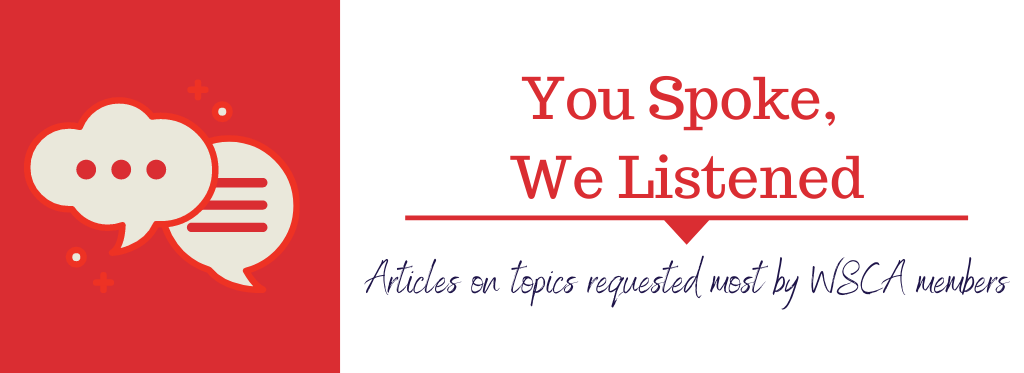
![]()
Black Lives Matter at School Week
In the school counselor world, most of the messaging in February from state and national association centers on National School Counseling Week. There are also two other national awareness campaigns that we would like counselors to learn more about in February.
February 1-5, 2021 is Black Lives Matter at School week. Black Lives Matter at School is a national coalition organizing for racial justice in education. They encourage all educators, students, parents, unions, and community organizations to join our annual week of action during the first week of February each year. You can find information, resources, and ways to get involved at https://www.blacklivesmatteratschool.com/.
All of you are aware that February is black history month. I would encourage you to take a moment and learn more about how the African American community has been working for over 100 years to have their history and voice represented accurately in education. How can it seem like we have come so far yet have so so far to go in racial equality in our country? School counselors should be engaging in racial equity work year-round, however, this is our opportunity to reflect and place an emphasis on putting equity at the center of school counseling programs. WSCA will be sharing our kick-off for equity professional development at our NSCW Breakfast Celebration.
We encourage you to review the following resources as you work towards building equity into your comprehensive school counseling programs and school communities.
- WSCA Racial Equity Resource Page
- WSCA & CASC Website (covid19k12counseling.org) added Essential Resources for Anti-Racist Educators page
- ASCA Anti-Racism Resources
- Watch the “Growing Up Milwaukee” Documentary which follows the lives of three black Milwaukee teenagers.
- Participate in the Smithsonian’s National Museum of African American History and Culture (NMAAHC) virtual events and conversations that affirm and preserve the accomplishments of African Americans throughout history.
- 2020 UW–Madison Diversity Forum, “The Pandemic Effect: Exposing Racism & Inequities” Recordings and Handouts
![]()
Self Care is Key
Jaleesa Joy
Milwaukee Spanish Immersion School, Milwaukee Public Schools
As Counselors we are aware of our duty to help others whether they be elementary, middle, high or beyond school age and because of that, the collective “we”, stop there. What I mean by that is we care, being a Counselor who cares is a fact of life. But, what the collective “we” tend to do is look out for others’ well-being more-so than our own. Does that sound familiar? Well, for me, this became apparent when others would point out that I was not the same patient individual but instead became someone who was stressed and worried more than happy. Enter…self-care.
Self-care for me was a journey and one I continue everyday as I navigate this Pandemic, family and friends, and working from home in a virtual school setting at a new school. So before the start of the school year I became interested in developing a morning routine. This was gold for me, making sure that there is a routine to my day before my day officially starts. So now I make it a point to move my body daily, while working out at least 5 days per week. I have also incorporated a gratitude practice of writing 3-5 things I am grateful for each day. This has helped me move my body as well as my heart in order to be there for my students. Another thing that I do for self-care is journal and read. I have also recently gotten into meditation or pausing and breathing for a minute or two. This has also been something that is incorporated into my Counselor services for students to take a mindful moment and learn the many ways that we can care for ourselves during this time and beyond. My recommendation if you don’t know where to start is to google ‘self-care’, ask a friend or co-worker, journal about things that make you happy or start by taking 3 deep breaths.
![]()
Responsiveness adds new and unique programs, lots to offer to students
Sara Mackey, Wisconsin Technical Colleges
Around the time of this article’s publication, the Wisconsin Technical College System will be launching a new website with advanced program search features. This is a great opportunity to explain how students and their advocates can learn more about the breadth of programs around the state’s technical colleges. Not all programs are offered at all colleges and no two colleges offer the exact same programs. The comprehensive statewide website provides global information covering all 16 colleges. Conversely, the individual college sites provide direct information about enrollment and the specific programs and offerings available at that college.
Program development process
The 16 colleges within the Wisconsin Technical College System work continuously to equip students with the skills employers need to serve their communities, while providing an enriching education marked by value and relevance. There is a range of programs offered among the colleges, and a student might need to look outside their own local college to enroll in a particular program. 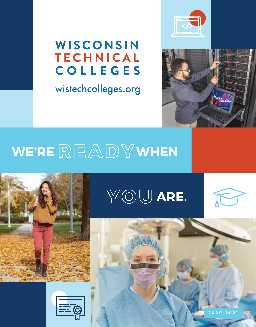 Fortunately, the statewide site (wistechcolleges.org, to become wtcsystem.edu after mid-February) will help students and their parents or advocates locate those unique programs when they are of interest but maybe not available at the student’s local college.
Fortunately, the statewide site (wistechcolleges.org, to become wtcsystem.edu after mid-February) will help students and their parents or advocates locate those unique programs when they are of interest but maybe not available at the student’s local college.
Assisting potential students
Today’s students are savvy, and value their independence and individuality. More of them may consider a move for a college (not just a four-year college) than in the past. It can also be helpful if students understand why the diversity of programs around the state might serve as an opportunity and not a limitation. Students shouldn’t feel discouraged from pursuing their goals based on the availability of a program but empowered by a greater understanding of the industry in which they seek a career.
A discussion of market demands and potential challenges or opportunities of a program that might be less readily available (for example Aeronautics or Anesthesiology Technology) can be very valuable. Also, school counselors and advocates may use the website to identify and recommend programs that might similarly fulfill the students’ interests (another feature of the website). Or they can actively encourage the student to pursue the program at the college outside their own district boundaries, which may help expand their opportunities for growth.
Following market demands
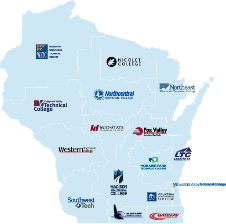 An example of a program offered at all colleges is nursing. For many years now, there have been more students applying to the program than there is capacity – but it’s not just a matter of hiring more instructors. For nursing, one of the most important capacity limitations is also the most critical to student’s practicum experience – i.e., the clinical sites and whether spaces exist for the number of students looking for a spot. Capacity challenges sometimes require students be placed on a waitlist. With guidance, students may be encouraged to begin taking general education credits, also exposing them to other skills or interests they may not have recognized previously. Counselors can help by guiding the student to explore a different program within the healthcare category which may have similar characteristics to nursing, without the waitlist.
An example of a program offered at all colleges is nursing. For many years now, there have been more students applying to the program than there is capacity – but it’s not just a matter of hiring more instructors. For nursing, one of the most important capacity limitations is also the most critical to student’s practicum experience – i.e., the clinical sites and whether spaces exist for the number of students looking for a spot. Capacity challenges sometimes require students be placed on a waitlist. With guidance, students may be encouraged to begin taking general education credits, also exposing them to other skills or interests they may not have recognized previously. Counselors can help by guiding the student to explore a different program within the healthcare category which may have similar characteristics to nursing, without the waitlist.
There are many outstanding health-related careers that may be just as satisfying, such as Radiography, Medical Assistant or Cardiovascular Technology, to name a few. It could also help reveal which students truly are committed to becoming a nurse, which is a very rigorous program requiring high levels of commitment and dedication.
In many cases, program discontinuance follows marketplace changes. For example, a declining program in recent years is printing. The printing process has become more automated and there is less demand for printed materials, leading to fewer overall positions in the field but more advanced-skill positions. Despite some fears – automation is not expected to replace all jobs – it may just require higher-level jobs to manage the computer-run automation.
Maintaining efficiency and effectiveness
Another justification for uneven program distribution is that certain programs, like aviation, might have significant barriers, such as expense (for the college and the student), or difficult requirements such as mandatory flight time (and cost) needed to qualify for certification or licensing. The benefit of limiting such a program helps protect against a glut in the market, with limited employment opportunities sometimes leaving graduates to feel the time and expense may not have been worthwhile.
Often, programs in new or emerging fields need time to get up and running at one college, and they will eventually expand as demand grows or the career becomes better known. Automation is one career responsible for transforming manufacturing into a high-tech, high-skilled industry where fewer entry-level employees may be required, but the skills needed are advanced and the rewards may be more diverse and fulfilling.
Location, timing or industry influence
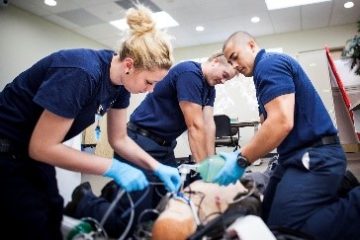
There are a few programs that are more relevant when overseas military engagement is peaking, such as shipbuilding at Northeast Wisconsin Technical College. The college’s proximity to several Great Lakes is a factor for assembly purposes. In that case, timing and location are known to influence this program’s availability.
Industry influence may also help programs thrive regionally. Examples include the various FABTECH programs at Fox Valley Technical College. The industrial powerhouse Fabick Cat, (known for the Caterpillar product line) sponsors product-related training. The company, through scholarships and/or equipment, supports the program and the students have respected education and career potential with an industry leader. Similar programs are available through Fox Valley in partnership with General Motors (GM). Similarly, Gateway Technical College has relationships with manufacturers such as IBM, Snap-On, S.C. Johnson and more, in addition to offering many non-branded programs.
A note about program development
Generally, the colleges determine the programs they offer with some input from their local employers, but they do so with guidance from the Wisconsin Technical College System Board. System and college leaders strive to maintain an efficient higher educational system, because tuition and property taxes are the largest funding sources for the colleges. The technical colleges consider Employers are strong and dynamic partners, both formally through advisory committees and informally. The partnerships ensure the colleges’ responsiveness and relevance in programming and workforce development, which benefits students and their communities.
Editor’s note: A recent report from AdvanceCTE compares successful models of program allocation efforts at Wisconsin’s Technical Colleges’ and various other states.



